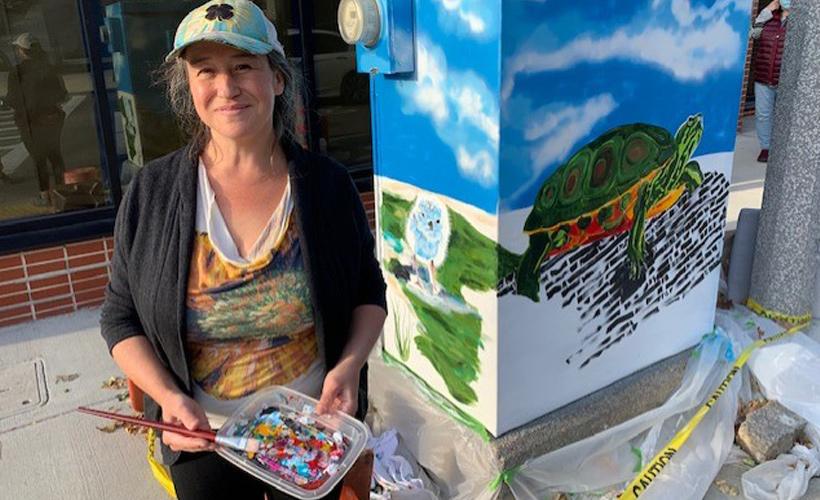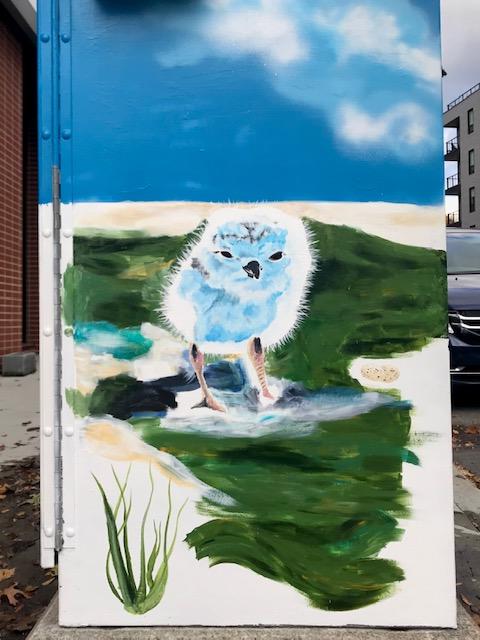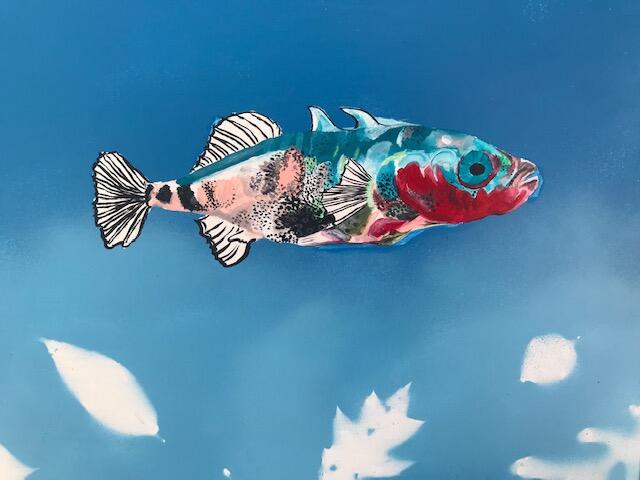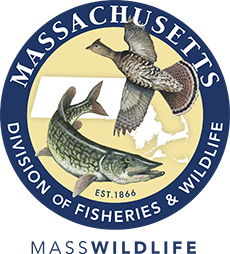- Division of Fisheries and Wildlife
Media Contact
Media Contact, MassWildlife

Did you know endangered animals and plants might be living right in your community? To raise awareness of rare, local species, artist Jovielle Gers recently completed a mural for the City of Boston called “Meet your Neighbors” featuring a red-bellied cooter, piping plover, threespine stickleback, and sandplain gerardia. You can view this mural at 3201 Washington Street in Jamaica Plain on the corner of Washington and Montebello Streets. Red-bellied cooters and sandplain gerardia are listed as endangered under the Massachusetts Endangered Species Act, while piping plovers and threespine stickleback are listed as threatened. You may be surprised to learn these rare species are all found within an hour drive of Boston.
Artist Jovielle Gers said the inspiration behind the piece is to introduce Boston to some of their rare and endangered neighbors using each side of the mural to highlight the winged ones, the swimmers, the crawlers, and the rooted ones who live here too. Gers said she hopes the mural will “raise awareness and inspire awe at the beauty of these incredible creatures and bring them in a safe way right into the middle of the city. I believe the more we can experience awe on this incredible planet and awe at our chance to be alive, the more respect we will have for the mystery and beauty of life.”
MassWildlife’s Natural Heritage and Endangered Species Program (NHESP) is responsible for the conservation and protection of over 430 animals and plants that are most vulnerable in Massachusetts. These species play an important role in keeping the Commonwealth’s natural communities thriving. “We are often asked how interested citizens can get more involved in rare species conservation efforts. One of the best things you can do is start by familiarizing yourself with what rare animals and plants have been observed in your town,” said Dr. Eve Schlüter, Assistant Director of MassWildlife’s NHESP. MassWildlife offers a Rare Species Viewer tool that allows citizens to search by town or species name to view rare animal and plant records. “If you’re more aware of your wild neighbors and what habitats they’re likely to be found in, you will be more likely to recognize them. We hope this will lead to more sighting reports that enable us to better protect those animals and plants that are most at risk.” Gathering these observations from the public is critical for the continued success of MassWildlife’s conservation efforts and helps MassWildlife watch for changing trends. If you have information on the location of a rare species or vernal pool and would like to help NHESP keep its database current, you can submit your observations through MassWildlife’s Heritage Hub.
In addition to reporting sightings of rare species, you can also support MassWildlife’s NHESP through donations. All money donated to MassWildlife's Natural Heritage and Endangered Species Program goes towards conserving the rare animals and plants that call Massachusetts home. Your donation goes toward equipment and services needed to give these species a fighting chance. There are a few ways you can donate:
- Online with a credit card or electronic check
- Through your MassFishHunt account
- By check made payable to "Comm. of MA—NHESP" and mailed to: MassWildlife, 1 Rabbit Hill Road, Westborough, MA 01581
- On your state income tax form. Look for line 33A on your state income tax form to contribute, or simply tell your tax preparer that you want to donate to the Endangered Wildlife Conservation Fund. You can donate even if you are not owed a refund.
This mural was commissioned by PaintBox—a program supported by the Boston Transportation Department, Boston Public Works Department, and administered by the Mayor’s Office of Arts and Culture.


